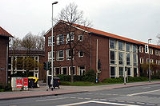
Gymnasium Paulinum
Encyclopedia
Gymnasium Paulinum is a Gymnasium (secondary) school in Münster
, North Rhine-Westphalia
, Germany
. It was founded in around 797
and is claimed to be the oldest school in Germany.
the missionary in 797. He had been instructed by Charlemagne
in 793 to preach Christianity in north-western Saxony, and subsequently established a monastery in the centre of the former Frankish stronghold of Mimigernaford (also Mimigardeford or Miningarvard), which was later to be known as Münster. He also established a monastic school for future members of the clergy. In 805, when Ludger was appointed Bishop of Münster, the school became a cathedral school. The new "Schola Paulina" was dedicated to St. Paul.
Münster
Münster is an independent city in North Rhine-Westphalia, Germany. It is located in the northern part of the state and is considered to be the cultural centre of the Westphalia region. It is also capital of the local government region Münsterland...
, North Rhine-Westphalia
North Rhine-Westphalia
North Rhine-Westphalia is the most populous state of Germany, with four of the country's ten largest cities. The state was formed in 1946 as a merger of the northern Rhineland and Westphalia, both formerly part of Prussia. Its capital is Düsseldorf. The state is currently run by a coalition of the...
, Germany
Germany
Germany , officially the Federal Republic of Germany , is a federal parliamentary republic in Europe. The country consists of 16 states while the capital and largest city is Berlin. Germany covers an area of 357,021 km2 and has a largely temperate seasonal climate...
. It was founded in around 797
797
Year 797 was a common year starting on Sunday of the Julian calendar. The denomination 797 for this year has been used since the early medieval period, when the Anno Domini calendar era became the prevalent method in Europe for naming years.- Byzantine Empire :* July 17 – Irene of Athens...
and is claimed to be the oldest school in Germany.
Early history
Gymnasium Paulinum was established by LudgerLudger
Saint Ludger was a missionary among the Frisians and Saxons, founder of Werden Abbey and first Bishop of Münster in Westphalia....
the missionary in 797. He had been instructed by Charlemagne
Charlemagne
Charlemagne was King of the Franks from 768 and Emperor of the Romans from 800 to his death in 814. He expanded the Frankish kingdom into an empire that incorporated much of Western and Central Europe. During his reign, he conquered Italy and was crowned by Pope Leo III on 25 December 800...
in 793 to preach Christianity in north-western Saxony, and subsequently established a monastery in the centre of the former Frankish stronghold of Mimigernaford (also Mimigardeford or Miningarvard), which was later to be known as Münster. He also established a monastic school for future members of the clergy. In 805, when Ludger was appointed Bishop of Münster, the school became a cathedral school. The new "Schola Paulina" was dedicated to St. Paul.
Latest developments
On October 9th, 2007 the Gymnasium Paulinum was awarded the title "School of Europe" ( Europaschule ) as one of the first of 15 schools in the province of North Rhine-Westphalia.Notable alumni
- Bernhard von GalenBernhard von GalenChristoph Bernhard Freiherr von Galen was prince-bishop of Münster. He was born into a noble Westphalian family....
, prince-bishop of Münster - Heinrich BrüningHeinrich BrüningHeinrich Brüning was Chancellor of Germany from 1930 to 1932, during the Weimar Republic. He was the longest serving Chancellor of the Weimar Republic, and remains a controversial figure in German politics....
, Chancellor of Germany from 1930 to 1932 - Leonard LandoisLeonard LandoisLeonard Landois was a German physiologist who was a native of Münster. He studied medicine at the University of Greifswald, and was later a professor and director of the institute of physiology at Greifswald. In 1866 he became a member of the German Academy of Sciences Leopoldina...
, physiologist - Hermann LönsHermann LönsHermann Löns was a German journalist and writer. He is most famous as "The Poet of the Heath" for his novels and poems celebrating the people and landscape of the North German moors, particularly the Lüneburg Heath in Lower Saxony. Löns is well known in Germany for his famous folksongs...
, journalist and writer - Josef PieperJosef PieperJosef Pieper was a German Catholic philosopher, at the forefront of the Neo-Thomistic wave in twentieth century Catholic philosophy. Among his most notable works are The Four Cardinal Virtues: Prudence, Justice, Fortitude, Temperance; Leisure: the Basis of Culture; The Philosophical Act and Guide...
, philosopher - Hans TietmeyerHans TietmeyerHans Tietmeyer is a German economist and regarded as one of the foremost experts on international financial matters. He was president of Deutsche Bundesbank from 1993 until 1999 and remains one of the most important figures in finance of the European Union....
, economist

